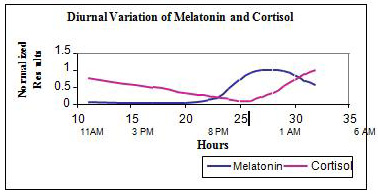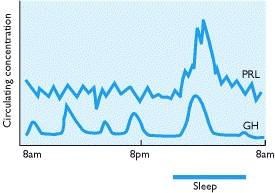Rest - "While you were sleeping"

Your body does most of its repair and maintenance while you sleep
Getting a good sleep is essential for health. Signs of poor sleep include not feeling rested even after getting enough sleep, repeatedly waking up during the night, and experiencing sleep disorder symptoms (e.g. snoring, gasping for air).
What is sleep?
Sleep can be defined as a reversible state (distinguishes from coma/hibernation) of:
– Reduced sensory and motor interaction with the environment
– Stereotyped posture – E.g. humans lie down with eyes closed.
Contrast this to wakefulness:
– Sensations are vivid and originate in external environment
– Motor activity is voluntary
Not getting enough sleep, particularly not getting enough uninterrupted sleep, is a major and common cause of many health and emotional problems.
What causes us to fall asleep?
Environmental lighting signals the brain to try to put us to sleep or keep us awake. Light levels are received by the retina and transferred through the optic nerves to the hypothalamus, a minute structure in the brain. Essential for hypothalamic control of the body’s circadian rhythms, diminishing light initiates the natural sleep process and brightening light begins the natural wake-up call.
We don’t go to sleep gradually. The brain actually produces different frequency and amplitude brain waves when you are awake compared to when you are asleep. There is no in-between area.

For information on the brain’s different sleep frequencies and patterns
How likely we are to fall asleep depends on three things
(1) The size of your sleep debt – If your sleep debt is large enough, no amount of will power or caffeine will be enough to keep you awake.
(2) How alert you are because of what’s going on. E.g. boring work versus stressful work.
(3) Time of day. Several biological clocks in our body generate 24 hour circadian rhythms that ensure our ability to adapt to and keep in harmony with the 24 hour day/night and seasonal changes of the earth. These rhythms trigger hormonal release and influence cardiovascular, behavioral and other functions.
Sleep hormones
MELATONIN / CORTISOL

Ideally:
DHEA - "Consciousness Hormone"
There is just enough DHEA to maintain autonomic function during sleep.
REM sleep occurs when DHEA rises to stimulate brain activity. But not enough to initiate consciousness.
GROWTH HORMONE(GH) / PROLACTIN
Anabolic (energy producing) hormones released during first part of sleep are important for muscle repair and recovery. GH not only helps build new cells, it is also important in rebuilding old, damaged cells and is therefore important in staying young.
Sleeping less can stunt growth (in young people) by reducing GH.

ADRENOCORTICOTROPIC HORMONE (ACTH)
Produced in the hypothalamus. Migrates to the pituitary, where it is released into the blood stream to be carried to the adrenal glands.
In some textbooks, ACTH is given credit for being the only stimulator of DHEA and CORTISOL. DHEA is increased 3.5 fold by ACTH. [Am. J. Obstetrics and Gynecology 1987; 156: 1275]. ACTH appears to affect sleep through its effect on adrenal corticosteroid secretion.
DOPAMINE
Amount of sleep needed at different life stages
53% of people 18 -29 years old say they suffer from daytime sleepiness – many young people are killed in traffic accidents.
| Age Group | Recommended Hours of Sleep Per Day | |
|---|---|---|
| Newborn | 0–3 months | 14–17 hours (National Sleep Foundation)1 No recommendation (American Academy of Sleep Medicine)2 |
| Infant | 4–12 months | 12–16 hours per 24 hours (including naps)2 |
| Toddler | 1–2 years | 11–14 hours per 24 hours (including naps)2 |
| Preschool | 3–5 years | 10–13 hours per 24 hours (including naps)2 |
| School Age | 6–12 years | 9–12 hours per 24 hours2 |
| Teen | 13–18 years | 8–10 hours per 24 hours2 |
| Adult | 18–60 years | 7 or more hours per night3 |
| 61–64 years | 7–9 hours1 | |
| 65 years and older | 7–8 hours1 | |
Source: National Center for Chronic Disease Prevention and Health Promotion, Division of Population Health
1. Hirshkowitz M, Whiton K, Albert SM, Alessi C, Bruni O, et al. The National Sleep Foundation’s sleep time duration recommendations: methodology and results summary. Sleep Health. 2015;1(1):40–43.
2. Paruthi S, Brooks LJ, D’Ambrosio C, Hall WA, Kotagal S, Lloyd RM, et al. Recommended amount of sleep for pediatric populations: a consensus </span>statement of the American Academy of Sleep Medicine. J Clin Sleep Med. 2016;12(6):785–786.
3. Watson NF, Badr MS, Belenky G, et al. Recommended amount of sleep for a healthy adult: a joint consensus statement of the American Academy of Sleep Medicine and Sleep Research Society. Sleep. 2015;38(6):843–844.
Babies. Sleep spread over 6-7 brief periods of sleep. Parents become extremely sleep deprived because it is not until many months that the baby will sleep for as long as five hours at a time. It is very important that a mother-to-be has absolutely NO sleep debt before a baby is born.
PROLACTIN is released during first cycle of deep sleep and also by nursing mothers. It is interesting that nursing mothers seem to do remarkably well without their usual amount of sleep. The release of PROLACTIN from breast-feeding makes it possible to function with a lot less sleep. A benefit lost by women who are not breast feeding.
Sleep loss affects how well children learn
Preschoolers and Younger Children. Need ~10 – 13 hours of sleep before they reach puberty, in addition to time taken to fall asleep. ADHD (also known as bad behavior 🙂 ) would be noticeably improved if children had more sleep, which means them going to bed around 7-9 pm. Remember, the darker the room, the easier it is for them to fall asleep and stay asleep.
Preteens. Need ~10 hours of sleep, plus the time it takes them to fall asleep. Bedtime ~9pm for a 7am rise. Studies have shown that children who are often grumpy or unhappy have a significant improvement in behavior when they get their 10 hours sleep EVERY night. A school in New Zealand changed the school hours for boys, since apparently this rule applies even more to boys than to girls. The boys do not have to come to school till 10.00 am. After that rule was applied, behavior and grades markedly improved.
Teenagers
William C. Dement (a pioneer in sleep research in the U.S.) found that teens have very different sleep needs than children/adults. They find it difficult to fall asleep before ~ midnight or even 1am, which means they actually need to sleep in until noon. School start times for teenagers should start much later than they do.
Sleeping less can stunt growth in teenagers. Puberty comes with a rise in blood growth hormone (GH) levels, and GH is reduced with less sleep.











